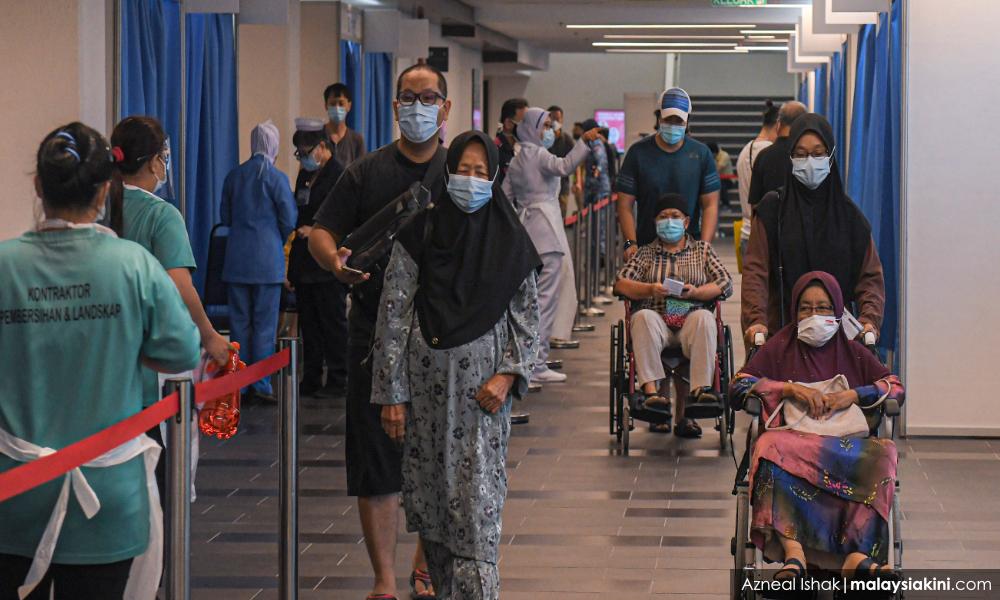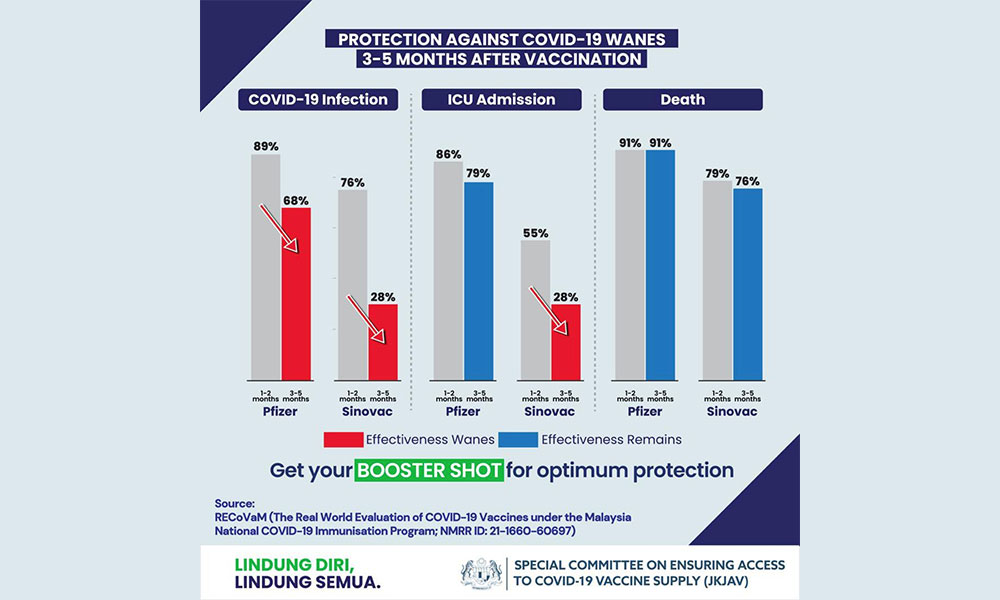Unlike the government’s successful rollout of Covid-19 vaccines just months ago, the reception for its booster programme that started in October has been lukewarm.
As many of 40 percent of people who received an appointment for a booster shot failed to turn up, according to Health Minister Khairy Jamaluddin.
When the Health Ministry held a lengthy press conference on Nov 12 touting the superior effectiveness of heterologous boosters using Pfizer’s Covid-19 vaccine, it did not however attempt to allay public concerns regarding safety of this mix-and-match strategy.
Against this backdrop, Universiti Malaya epidemiology professor Dr Moy Foong Ming lamented that misinformation regarding the safety of heterologous boosters have festered online.
“The main reason for mixing Sinovac with other vaccines is because the mixing with Pfizer or AstraZeneca will produce up to 94 to 95 percent vaccine effectiveness, while using Sinovac as the booster will only provide 75 percent vaccine effectiveness.
“It is unfortunate that there is a lot of unverified information against the mixing of Sinovac with Pfizer being circulated on social media.
“We are aware that many individuals are influenced and declined the Pfizer vaccine as booster. This has jeopardised the Health Ministry’s efforts to provide additional protection to these groups,” she said in an opinion piece yesterday.

In contrast to the popular belief, she said heterologous boosters - where the vaccine used as a booster is different from those used for the primary vaccination series - has already been tried in other countries.
“For example, Indonesia, Singapore and Chile mixed Sinovac with Pfizer; while Thailand and Cambodia mixed Sinovac with AstraZeneca.
“Western countries have also been mixing their available vaccines (Pfizer, AstraZeneca and Moderna). There have been no known severe side effects reported from these countries,” she said.
Moy’s article is reproduced in full below.
For context, it was written before the Health Ministry announced a booster schedule and allowed people previously vaccinated with the Sinovac vaccine to have the option of getting the same vaccine as a booster shot. It also extended booster eligibility to all adults.
The current Covid-19 situation and booster dose
The minister and director-general of our Health Ministry are both warning us that there may be a new wave of Covid-19 infection if the situation gets worse. Clinicians treating Covid-19 patients also highlighted that the Covid-19 hospital admissions and Intensive Care Unit (ICU) usage are on the rise.
Are they being overly worried and pessimistic about our country’s Covid-19 situation? Why is this happening when our vaccination rate is almost reaching 80 percent for the whole nation? Let’s go through some of the statistics related to Covid-19.
The R-naught (represents the number of people that an infected person transmits that disease to) for Covid-19 was 0.87 on Oct 22 and it was fluctuating below 1.0 until Nov 11.
Since then, the R-naught values have increased and fluctuated between 1.0 to 1.05, with the latest value at 1.0 on Nov 22.
An R-naught of less than 1.0 is required if we want the total infection to be reduced.
The lowest number of daily cases of 4,343 was recorded on Nov 7, but there was no further improvement. Instead, the total daily cases had increased to 6,380 on Nov 18 and fluctuated between 4,000-plus to 6000-plus since then.
Concurrently, the ICU usage in some states such as Selangor, Kuala Lumpur, Kelantan, Penang, Putrajaya is more than 75 percent.
Despite the total population’s full vaccination rate having reached 76.6 percent (as of Nov 23), we noticed that our Covid-19 situation is not further improved. Why did this happen?

First, with the opening of most sectors and interstate travel allowed, this has increased the mobility of our people. When mobility is increased and if there is poor compliance of standard operating procedures for Covid-19 among some people, this will incur transmission among unvaccinated as well as vaccinated people.
Waning immunity
We are also well aware that vaccination is not 100 percent effective in the prevention of transmission, but just effective in the prevention of severe Covid-19, hospitalisation and death.
This situation may become more serious when evidence shows that the vaccine effectiveness will wane over time.
From the latest data from the Recovam study (The Real World Evaluation of Covid-19 Vaccines under the Malaysia National Covid-19 Immunisation Programme), the vaccine effectiveness in the prevention of Covid-19 infection reduced to 68 percent (Pfizer) and 28 percent (Sinovac) in three to five months after full vaccination.
The prevention of ICU admission among individuals vaccinated with Pfizer and Sinovac vaccines at three to five months was 79 percent and 28 percent respectively, while the prevention of death for both vaccines was 91 percent and 76 percent respectively.
This evidence shows that vaccine effectiveness wanes over time, with the waning effect from Sinovac vaccine being below 50 percent – a cut-off value acceptable for vaccine effectiveness.
Concurrently, the analysis on deaths among patients taking different vaccines showed that there were 6.0 deaths per one million population for AstraZeneca vaccine, 9.8 deaths per one million population for Pfizer vaccine and 34 deaths per one million population for Sinovac vaccine.
No known severe side effects
All the above data showed that the waning effect of vaccine, especially Sinovac vaccine that wanes faster, caused higher deaths compared to other vaccines.
Of course, the findings may be influenced by the age of these patients who are mostly from the senior citizen group.
That is why the Health Ministry is aggressively pushing for booster doses among the senior citizens and high-risk groups with comorbidities who took the Sinovac vaccines.
However, the response for booster dose is poor due to the reason that only Pfizer vaccine is offered as booster currently. There are worries about the adverse side effects of taking the booster dose that is different from the first two doses.
Mix-and-match vaccination, especially for booster dose, has been practised in many countries.
For example, Indonesia, Singapore and Chile mixed Sinovac with Pfizer; while Thailand and Cambodia mixed Sinovac with AstraZeneca. Western countries have also been mixing their available vaccines (Pfizer, AstraZeneca and Moderna).
There have been no known severe side effects reported from these countries.
The main reason for mixing Sinovac with other vaccines is because the mixing with Pfizer or AstraZeneca will produce up to 94 to 95 percent vaccine effectiveness, while using Sinovac as the booster will only provide 75 percent vaccine effectiveness.
We can’t afford another lockdown
It is unfortunate that there is a lot of unverified information against the mixing of Sinovac with Pfizer being circulated on social media. We are aware that many individuals are influenced and declined the Pfizer vaccine as booster.
This has jeopardised the Health Ministry’s efforts to provide additional protection to these groups.

Our country cannot afford to have another lockdown when our health care system is overburdened with more severe Covid-19 infections that require ICU usage.
We should take note of new waves happening in some European countries that have to enforce a lockdown (Austria and Netherlands) or contemplate a lockdown (Germany). Their people have been complaining that their governments had not taken prevention measures early enough to prevent the spike in Covid-19 infections that caused lockdown to be implemented.
Our people should value the freedom we enjoy currently, comply with SOPs during work or leisure, go for booster dose when called. Do not wait for a vaccine brand that is unavailable, go for the first one being offered to get yourself and your loved ones protected.
We hope the Health Ministry can also expedite the inclusion of Sinovac vaccine in the national immunisation programme.
We as Malaysians should do our part so that the Covid-19 situation is well-controlled, and our country can move on to improve the economic situation. - Mkini





No comments:
Post a Comment
Note: Only a member of this blog may post a comment.